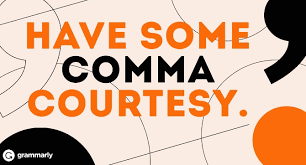 From grammarly.com From grammarly.com Are you wondering what in the world this spoonful is about? It's a mouthful and a half, so get ready: Comma Rule #5 covers APPOSITIVE PHRASES!! Clear as mud, right?!? No worries! Read on and all will be explained. I refer to these as interrupters - words added to provide extra detail. These interrupters are bookended by commas or dashes: if lifted out of a sentence, the sentence will remain complete. Here's an example: The waiters, all wearing blue aprons, handed out refreshments to the crowd. If you lift out the section between the commas, you're left with this: The waiters handed out refreshments to the crowd. Is that still a complete sentence (AKA INDEPENDENT CLAUSE)? YES! Let's look at one more example, this time using dashes. (SPECIAL NOTE: These are supposed to be the longer EM dashes, not the typical shorter variety.) The dog - panting with excitement - watched the boys play soccer. Here's the complete sentence without the interrupter: The dog watched the boys play soccer. Does it matter whether you use commas or dashes? No, but commas are most common by far. The ACT, however, seems to favor dashes. The most important point to remember, whether you personally favor commas or dashes, is that the sentence must remain complete when the interrupter is removed. If you see one dash on a standardized test - ACT or SAT - they could be testing if you recognize the need for a second dash. If that doesn't work, the dash could be functioning like a colon instead. I'll leave you with an example of a single (em) dash used as a colon. Jason was the league's highest scorer - a shoo-in for a football scholarship. (Notice how that information is expected, rather than a surprise or information list, as is the case with a colon? That's splitting hairs, perhaps, but you can be the judge.) That's a wrap! There are still a few more comma rules to cover, so stay tuned for the next spoonful. Sincerely, Laura Fineberg Cooper
4 Comments
5/6/2019 05:20:00 pm
Interesting that the ACT uses a lot of dashes. I don't come across them very often and considered them more of an artistic device for emphasis, since they seem to stand out more than commas. I usually use an em dash rather than an en which can look like a hyphen.
Reply
5/6/2019 06:35:34 pm
Thank you for your insightful comment, Marcia. I never actually noticed that some dashes were longer than others, but actually the dashes used in place of commas or a colon are supposed to be of the longer (em) variety! I like thinking of these as the artistic choice. Dashes are particularly appropriate when the information is a useful addition rather than a detail that may or may not be necessary. With em dashes in place of a colon, those could be looked at as expected conclusions as opposed to a shocking revelation or a list. Not exactly a spoonful, is this?!
Reply
6/11/2019 09:05:02 am
Superior post, keep up with this exceptional work
Reply
Leave a Reply. |
Welcome to
|
 RSS Feed
RSS Feed
